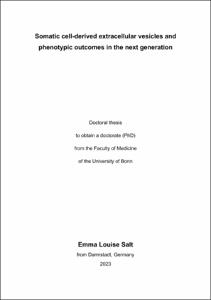Somatic cell-derived extracellular vesicles and phenotypic outcomes in the next generation

Somatic cell-derived extracellular vesicles and phenotypic outcomes in the next generation

| dc.contributor.advisor | Ehninger, Dan | |
| dc.contributor.author | Salt, Emma Louise | |
| dc.date.accessioned | 2023-05-31T11:52:38Z | |
| dc.date.available | 2025-06-02T22:00:38Z | |
| dc.date.issued | 31.05.2023 | |
| dc.identifier.uri | https://hdl.handle.net/20.500.11811/10868 | |
| dc.description.abstract | Evidence from both human and animal studies demonstrate that paternal experiences and exposures can cause phenotypic changes in the next generation. Extracellular vesicles (EVs) released by somatic cells are hypothesised to play a role in these paternal effects by acting as a messenger between somatic cells, including those of the male reproductive tract, and germ cells. To date, evidence acquired mainly from in vitro and a few in vivo studies confirm this EV-sperm interaction and information transfer. In this thesis, we aimed to establish an in vivo model system, in the mouse and in the fly, with inhibited secretion of EVs from somatic cells of the male reproductive tract, with the intention to utilise this model to study the impact of EVs on phenotypic outcomes in the next generation and their role as potential mediators of paternal intergenerational effects.
Within the epididymis of the male mouse reproductive tract, the knock-out of three different genes encoding proteins shown in in vitro studies to be involved in EV secretion or biogenesis did not change the number or size of EVs isolated from the epididymal fluid. This finding demonstrates the difficulty of transferability between model organisms in the EV field. Notably, mRNA sequencing analysis of the epididymal EVs from Rab27-DKO mice suggests a potential involvement of the EV mRNA in the sperm maturation process. Using the UAS-Gal4 system, we established a Drosophila melanogaster model with an inhibited secretion of CD63-GFP from secondary cells, by expressing RNAis against known components of the EV pathway. Prior to mating, these F0 flies were exposed to dietary interventions. Phenotypic and transcriptomic analyses of the generated F1 flies demonstrate paternal genotype and paternal diet dependent changes. These paternal intergenerational effects are firstly sex-specific and age-dependent, and secondly influenced by somatic cell-derived EVs. Furthermore, we are the first to observe that the exposure of male flies expressing Rab11-RNAi under dve-Gal4 control to high sugar and high fat diet cause pernicious sex-specific intergenerational effects. This finding is suggested to be caused by the combined vulnerability of paternal midgut cells and the exposure to energy dense foods, a so far unexplored paternal condition that causes phenotypic changes to the next generation. | en |
| dc.language.iso | eng | |
| dc.rights | In Copyright | |
| dc.rights.uri | http://rightsstatements.org/vocab/InC/1.0/ | |
| dc.subject | Extrazelluläre Vesikel | |
| dc.subject | intergenerative Effekte | |
| dc.subject | väterliche Effekte | |
| dc.subject | Drosophila melanogaster | |
| dc.subject | sekundäre Zellen | |
| dc.subject | väterliche Ernährungsintervention | |
| dc.subject | phänotypische Auswirkungen | |
| dc.subject | Extracellular vesicles | |
| dc.subject | intergenerational effects | |
| dc.subject | paternal effects | |
| dc.subject | Drosophila melanogaster | |
| dc.subject | secondary cells | |
| dc.subject | paternal dietary intervention | |
| dc.subject | phenotypic outcomes | |
| dc.subject.ddc | 500 Naturwissenschaften | |
| dc.subject.ddc | 570 Biowissenschaften, Biologie | |
| dc.subject.ddc | 610 Medizin, Gesundheit | |
| dc.title | Somatic cell-derived extracellular vesicles and phenotypic outcomes in the next generation | |
| dc.type | Dissertation oder Habilitation | |
| dc.publisher.name | Universitäts- und Landesbibliothek Bonn | |
| dc.publisher.location | Bonn | |
| dc.rights.accessRights | openAccess | |
| dc.identifier.urn | https://nbn-resolving.org/urn:nbn:de:hbz:5-70949 | |
| ulbbn.pubtype | Erstveröffentlichung | |
| ulbbnediss.affiliation.name | Rheinische Friedrich-Wilhelms-Universität Bonn | |
| ulbbnediss.affiliation.location | Bonn | |
| ulbbnediss.thesis.level | Dissertation | |
| ulbbnediss.dissID | 7094 | |
| ulbbnediss.date.accepted | 05.05.2023 | |
| ulbbnediss.institute | Angegliederte Institute, verbundene wissenschaftliche Einrichtungen : Deutsches Zentrum für Neurodegenerative Erkrankungen (DZNE) | |
| ulbbnediss.fakultaet | Medizinische Fakultät | |
| dc.contributor.coReferee | Pfeifer, Alexander | |
| ulbbnediss.date.embargoEndDate | 02.06.2025 | |
| ulbbnediss.contributor.gnd | 120689685X |
Files in this item
This item appears in the following Collection(s)
-
E-Dissertationen (1904)




